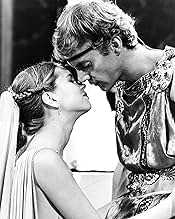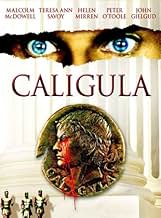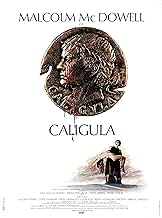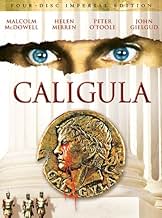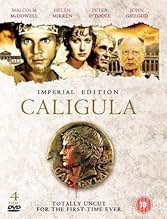Detalles de la historia gráfica y chocante, aunque innegablemente trágica, del más infame César de Roma.Detalles de la historia gráfica y chocante, aunque innegablemente trágica, del más infame César de Roma.Detalles de la historia gráfica y chocante, aunque innegablemente trágica, del más infame César de Roma.
- Dirección
- Guionistas
- Elenco
- Premios
- 1 premio ganado y 2 nominaciones en total
Mirella D'Angelo
- Livia
- (as Mirella Dangelo)
Rick Parets
- Mnester
- (as Richard Parets)
Pola Muzyka
- Subura Singer
- (as Paula Mitchell)
Joss Ackland
- Chaerea
- (English version)
- (voz)
- (sin créditos)
Opiniones destacadas
This film, as with all, has good points and bad points.
In general, I feel that the good ones far outweigh the bad.
The film simply gives the story of the rise and death of Emperor Caligula in a very straight-forward manner. Indeed, it can be seen as shocking, but I think that this is a side-effect of it's desire to be realistic, rather than a deliberate act on the part of the film-makers.
The cinematography and camera work is awful. The huge sets seem at times almost claustrophobic which is an absolute crime considering the magnificence of them. There is also too much emphasis on Caligula himself, to the detriment of revealing some important traits in other characters, making them seem somewhat shallow at times.
The sex scenes are very well placed within the context of the film. I thought that only two scenes stood out as being unnecessarily overt, but for the most part, the explicitness is on the fringe of the focus of each scene, while also playing a major part in the atmosphere.
Never once did I feel that any dialogue was out of place, nor did the acting strike me as being bad.
By far the biggest problem with this film is the fact that the sexual content is widely advertised and therefore anticipated before viewing. This may cause people to focus dominantly on those scenes without really looking at the film as a whole. For me, it enhanced the film. Not in a particularly titillating way, but in the fact that there was no compromise during scenes of sexual acts. Roman orgies are regarded to have been extremely opulent and promiscuous - I found it refreshing to see one as it may have actually been rather than lots of fully-clothed laughing fat men pouring red wine over their faces and eating grapes while draped with female automatons.
In summary, Caligula definitely has it's place in film history due to it's controversy, but if you look beyond that controversy, you should find a rather good film which neatly tells the story of how power can turn someone into a madman.
In general, I feel that the good ones far outweigh the bad.
The film simply gives the story of the rise and death of Emperor Caligula in a very straight-forward manner. Indeed, it can be seen as shocking, but I think that this is a side-effect of it's desire to be realistic, rather than a deliberate act on the part of the film-makers.
The cinematography and camera work is awful. The huge sets seem at times almost claustrophobic which is an absolute crime considering the magnificence of them. There is also too much emphasis on Caligula himself, to the detriment of revealing some important traits in other characters, making them seem somewhat shallow at times.
The sex scenes are very well placed within the context of the film. I thought that only two scenes stood out as being unnecessarily overt, but for the most part, the explicitness is on the fringe of the focus of each scene, while also playing a major part in the atmosphere.
Never once did I feel that any dialogue was out of place, nor did the acting strike me as being bad.
By far the biggest problem with this film is the fact that the sexual content is widely advertised and therefore anticipated before viewing. This may cause people to focus dominantly on those scenes without really looking at the film as a whole. For me, it enhanced the film. Not in a particularly titillating way, but in the fact that there was no compromise during scenes of sexual acts. Roman orgies are regarded to have been extremely opulent and promiscuous - I found it refreshing to see one as it may have actually been rather than lots of fully-clothed laughing fat men pouring red wine over their faces and eating grapes while draped with female automatons.
In summary, Caligula definitely has it's place in film history due to it's controversy, but if you look beyond that controversy, you should find a rather good film which neatly tells the story of how power can turn someone into a madman.
Let's not kid ourselves here, all ye art students, film-school nerds, and other self-loathing "cinema l'arte" snobs: had this exact same movie been released under the banner "directed by Pier Paolo Pasolini" you would have loved it - sorry: CLAIMED to have loved it - and praised it to high heaven, espousing its virtues in long essays, justifying its extreme sex and violence through some b.s. semantic pseudo-intellectual movie-critic-jargon mumbo-jumbo.
Go on, admit it. No-one will laugh. We promise.
This movie has been unanimously dismissed as exploitative trash and of no cinematic value by "notable" movie critics.
After having seen the full two-and-a-half hour version: a) I can certainly see why THEY would choose to view it that way b) I totally disagree The fact that "Caligula" was financed by Penthouse (gasp!) and directed by Tinto Brass (oh no!) is what this is all about.
An excellent cast includes McDowell (an ideal choice for Caligula - or any devious lunatic, for that matter) and Mirren (at the height of her enormous sex-appeal). There is terrific music from Khachaturian, an interesting story, some suspense, etc. A strong stomach is needed to watch this gore-fest, though.
A corny, historically inaccurate, fairy-tale-like piece of crap like "Gandhi" gets world-wide recognition, while a brutally realistic film about another historical figure gets the finger. Go figure.
Go on, admit it. No-one will laugh. We promise.
This movie has been unanimously dismissed as exploitative trash and of no cinematic value by "notable" movie critics.
After having seen the full two-and-a-half hour version: a) I can certainly see why THEY would choose to view it that way b) I totally disagree The fact that "Caligula" was financed by Penthouse (gasp!) and directed by Tinto Brass (oh no!) is what this is all about.
An excellent cast includes McDowell (an ideal choice for Caligula - or any devious lunatic, for that matter) and Mirren (at the height of her enormous sex-appeal). There is terrific music from Khachaturian, an interesting story, some suspense, etc. A strong stomach is needed to watch this gore-fest, though.
A corny, historically inaccurate, fairy-tale-like piece of crap like "Gandhi" gets world-wide recognition, while a brutally realistic film about another historical figure gets the finger. Go figure.
This movie gets way too much hate. It is not even close to being one of the worst movies I've seen.
Malcolm Mcdowell is fantastic as always. It is worth seeing just for his performance alone.
I was also really impressed by the costumes, I thought they were gorgeous. My favorite was the one Caligula wears near the end which is a gorgeous metallic green. You can tell the effort put behind not only the wardrobe but the hairstyles and the sets, they are some of the best aspects of the film. The costume designer Danilo Donati actually won some Oscars because of his work in other films.
Now, everybody who dislikes the film do so because of the very explicit porn. I agree most of the time is excessive and goes on for way too long, I think because of the nature of the story and character a certain amount of explicitness works, but for the most part I find it too be too much and too long.
If you take away the porn, this movie would be far better received. There's an actual story and it has great performances for the most part.
It is not perfect however, I do feel the movie stayed one note from beginning to end, doesnt feel like a 3 act story but it was worth it in the end. I am really looking forward to watching the new version that premiered at Cannes this year, hoping it becomes available to the general public very soon.
Malcolm Mcdowell is fantastic as always. It is worth seeing just for his performance alone.
I was also really impressed by the costumes, I thought they were gorgeous. My favorite was the one Caligula wears near the end which is a gorgeous metallic green. You can tell the effort put behind not only the wardrobe but the hairstyles and the sets, they are some of the best aspects of the film. The costume designer Danilo Donati actually won some Oscars because of his work in other films.
Now, everybody who dislikes the film do so because of the very explicit porn. I agree most of the time is excessive and goes on for way too long, I think because of the nature of the story and character a certain amount of explicitness works, but for the most part I find it too be too much and too long.
If you take away the porn, this movie would be far better received. There's an actual story and it has great performances for the most part.
It is not perfect however, I do feel the movie stayed one note from beginning to end, doesnt feel like a 3 act story but it was worth it in the end. I am really looking forward to watching the new version that premiered at Cannes this year, hoping it becomes available to the general public very soon.
For a period there, in the late 70s, we came very close to having real life in films. More real than ever. Oh, we had blood and tears, and an occasional breast, but the state of affairs was little different than that Disney TeeVee world where no bathrooms had toilets and sex was something oddly remote from the eye, always around the corner.
Partly, its that odd, odd American prudishness, that tut tut notion that invisible things are managed things. But partly there's the simple fact that no good case could be made for "watching." So a simple balance is maintained. Since sex sells, we'll have wet lips and vamping and wild joining of invisible parts. But we won't have life the way it really is, with all sorts of skin, intimacies and gentle touches. And smells.
Into this space you'll find various intrusions. I really thought "9 Songs" was immensely clever, justifiably cinematic. I also find from time to time clever ideas in ordinary porn. "Private Teacher" by an Orson Welles associate had some neat ideas sneaked in, as did "La Foire aux sexes" which was every bit a good new wave film.
And then you'll have something like this, which perhaps by itself set back the whole notion of intimacy in film three decades.
Its big, its loud, its stupid. Fortunately, this was before that insane silicone and shaved craze hit the girlie watcher's world. But its of the same ilk in a way.
Just think: Peter O'Toole, Hellen Mirren, John Geilgud for chrissakes! Not bad set design, in that Italian monstrosity tradition of Zefferelli. A script by Gore Vidal who knows nothing about how to flesh out a film (ouch, sorry), but whose larger arcs are solid. And Tinto Brass is not a bad filmmaker in the small, meaning he knows how to make a good image if not craft things as a project.
It could have worked, because by the late seventies, audiences had plenty of examples of performances that referenced and encapsulated other performances, so we could have what this could have been: a (film) performance of a (porn) performance of a (historical, voyeuristic-in-its-time) performance. And the projection of genital reality across those layers could have been intelligent as well as whatever else you may want.
For decades after Kinsey botched things with flawed science, Playboy was the vanguard of the sexual revolution. I'm not making this up; there really was a "Playboy philosophy" which boiled down to: "sex is natural and pleasant and if it doesn't hurt anyone, why not?" With hippies as a sort of mascot, this seemed intelligent, especially since the girlie pictures were surrounded with some of the best writing in print. Those centerfolds mattered.
Then along came a sort of second generation magazine which exploited the fact that Palyboy's girls had no body hair or genitals and were too linked to a set of obsolete fantasies. Penthouse girls had hair and fluids and were aggressive. Fewer coy blonds; more adventure. It was an equally vapid set of fantasies which as these things go went obsolete as quickly. But in the period of 76-80, that magazine was in the forefront of vaginal honesty in life. A forefront, such as society would allow.
And there was the Playboy tradition of wrapping things in intellectual goo. Which meant that this film could have been something that mattered, that changed things. It could have cast itself in the same useless space as the Romans it portrayed. But it made a strange bargain: the story has these acts as perverted, distorted life. Where ordinary films went way out of their way to not show certain things in sex, this went as far the other way to show them. Its a strange world where sexual positions and acts are arranged precisely so that you CAN see.
So I think like all great turning points in film, this film is important. Its not good, its ghastly. But its important because its mistakes hurt us in places that matter and missed an opportunity to make film better, richer.
Ted's Evaluation -- 1 of 3: You can find something better to do with this part of your life.
Partly, its that odd, odd American prudishness, that tut tut notion that invisible things are managed things. But partly there's the simple fact that no good case could be made for "watching." So a simple balance is maintained. Since sex sells, we'll have wet lips and vamping and wild joining of invisible parts. But we won't have life the way it really is, with all sorts of skin, intimacies and gentle touches. And smells.
Into this space you'll find various intrusions. I really thought "9 Songs" was immensely clever, justifiably cinematic. I also find from time to time clever ideas in ordinary porn. "Private Teacher" by an Orson Welles associate had some neat ideas sneaked in, as did "La Foire aux sexes" which was every bit a good new wave film.
And then you'll have something like this, which perhaps by itself set back the whole notion of intimacy in film three decades.
Its big, its loud, its stupid. Fortunately, this was before that insane silicone and shaved craze hit the girlie watcher's world. But its of the same ilk in a way.
Just think: Peter O'Toole, Hellen Mirren, John Geilgud for chrissakes! Not bad set design, in that Italian monstrosity tradition of Zefferelli. A script by Gore Vidal who knows nothing about how to flesh out a film (ouch, sorry), but whose larger arcs are solid. And Tinto Brass is not a bad filmmaker in the small, meaning he knows how to make a good image if not craft things as a project.
It could have worked, because by the late seventies, audiences had plenty of examples of performances that referenced and encapsulated other performances, so we could have what this could have been: a (film) performance of a (porn) performance of a (historical, voyeuristic-in-its-time) performance. And the projection of genital reality across those layers could have been intelligent as well as whatever else you may want.
For decades after Kinsey botched things with flawed science, Playboy was the vanguard of the sexual revolution. I'm not making this up; there really was a "Playboy philosophy" which boiled down to: "sex is natural and pleasant and if it doesn't hurt anyone, why not?" With hippies as a sort of mascot, this seemed intelligent, especially since the girlie pictures were surrounded with some of the best writing in print. Those centerfolds mattered.
Then along came a sort of second generation magazine which exploited the fact that Palyboy's girls had no body hair or genitals and were too linked to a set of obsolete fantasies. Penthouse girls had hair and fluids and were aggressive. Fewer coy blonds; more adventure. It was an equally vapid set of fantasies which as these things go went obsolete as quickly. But in the period of 76-80, that magazine was in the forefront of vaginal honesty in life. A forefront, such as society would allow.
And there was the Playboy tradition of wrapping things in intellectual goo. Which meant that this film could have been something that mattered, that changed things. It could have cast itself in the same useless space as the Romans it portrayed. But it made a strange bargain: the story has these acts as perverted, distorted life. Where ordinary films went way out of their way to not show certain things in sex, this went as far the other way to show them. Its a strange world where sexual positions and acts are arranged precisely so that you CAN see.
So I think like all great turning points in film, this film is important. Its not good, its ghastly. But its important because its mistakes hurt us in places that matter and missed an opportunity to make film better, richer.
Ted's Evaluation -- 1 of 3: You can find something better to do with this part of your life.
Excuse the title of this review however the bottom line is, it has to be seen to be believed. The purely supreme cast is more than likely the only thing keeping the film from being well and truly buried in a basement. Historical revelations indicate that the content of this film probably does in fact (to a degree) reflect the lunacy rampant at the time and yes that means....meaningless executions, wild paranoia, incest and of course the gratuitous sex which could probably leave some soft porn movies looking very average (provided you get the right version). No its not a true classic but it dabbles with taboo, and dares go where other films draw the line. Its one i'll watch again and one you'd have to see merely to say you saw it. 6/10 scorpio
¿Sabías que…?
- TriviaDame Helen Mirren described this movie as "an irresistible mix of art and genitals". Although many actors would regret their involvement with the film, Mirren has remained proud of her role as "the most promiscuous woman in all of Rome", as she believed European Cinema was reaching a benchmark in sex positivity and "it was the time to do nudity". She was, however, taken aback with the film's hardcore footage.
- ErroresCaligula squeezes a lemon over a captured slave. Lemons did not reach Europe until the 2nd century, at least 100 years after Caligula's death.
- Créditos curiososDue to numerous pending lawsuits and settlements at the time of the film's release, no one is technically fully credited for writing and directing the finished film.
- Versiones alternativasThe censored version of this film has been released of a few occasions in Australia. In March 1981, a censored, R rated release to cinemas was made by Roadshow. Roadshow Home Video subsequently released the same film version to video in September 1984. This version ran for 146 minutes (PAL). It was again re-released by a 'no name' video label in the late 1990's. The censored DVD version appeared in December 2004, released by Warner Vision. The uncut version has been released in Australia, this was the fully uncut, X rated 156 minute PAL version. It was released in January 1985 by 'Palace X Video' - a version that is now an extremely rare collector's item. The uncut version has since been rated R18+ by the Australian classification board in 2021.
- ConexionesEdited into Video Macumba (1991)
Selecciones populares
Inicia sesión para calificar y agrega a la lista de videos para obtener recomendaciones personalizadas
- How long is Caligula?Con tecnología de Alexa
Detalles
- Fecha de lanzamiento
- Países de origen
- Sitio oficial
- Idioma
- También se conoce como
- Caligula
- Locaciones de filmación
- Productoras
- Ver más créditos de la compañía en IMDbPro
Taquilla
- Presupuesto
- USD 17,500,000 (estimado)
- Total a nivel mundial
- USD 305
Contribuir a esta página
Sugiere una edición o agrega el contenido que falta


